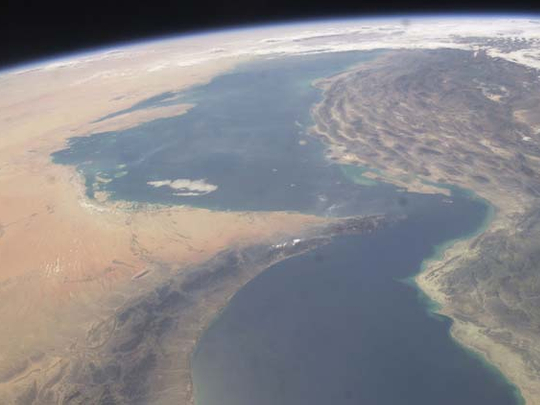
London/Washington: US officials and allies turned up the pressure on Iran to abandon its threats to close the Strait of Hormuz in retaliation for economic sanctions.
British Prime Minister David Cameron said on Friday that he and other members of the international community are determined to ensure that the mouth of the Arabian Gulf remains open to shipping.
"We are now looking at this whole issue of having an embargo on Iranian oil to get that regime to think again," Cameron told Al Arabiya television in Riyadh, where he held talks with Saudi King Abdullah Bin Abdul Aziz. "It is in the interests of the whole world that those straits are open, and I'm sure if there was any threat to close them the world would come together and make sure they stayed open."
The Obama administration has delivered that message to Iran's supreme leader, Ayatollah Ali Khamenei, privately as well as publicly, White House spokesman Jay Carney said on Friday.
The messages from the US and allies were directed at Iran and also at traders, said Kenneth Pollack, who heads the Saban Centre for Middle East Policy at the Brookings Institution in Washington. The Iranians sought to use threats to close the Strait to roil oil markets and hurt the US economically, he said.
"This was as much about calming the oil markets as it was about sending a message to the Iranians," Pollack said.
Oil dropped to a three-week low on Friday after two European Union officials with knowledge of talks on sanctions against Iran said an EU embargo is likely to be delayed for six months to let members find alternative oil supplies. The officials discussed the private talks on condition of anonymity.
Communication
Crude oil for February delivery fell 40 cents to $98.70 a barrel on the New York Mercantile Exchange, the lowest since December 21. Oil fell 2.8 per cent last week and is up 8 per cent from a year earlier.
While Iran and the US lack formal diplomatic relations, the two nations have "several" channels of communication, including the Swiss, who represent the US in Iran, where there is no American embassy, State Department spokesman Victoria Nuland said at a briefing in Washington on Friday.
"We have a number of ways that we have historically conveyed our views to the Iranian government," Nuland said. "We've used these mechanisms regularly on a range of issues over the years, and we have done so again in this case."
Private, or back-channel, messages allow for more subtle and detailed communication and the possibility of dialogue that usually isn't possible in public, Michael Eisenstadt of the Washington Institute for Near East Policy said.
The messages can be verbal, conveyed by a trusted messenger or in letters, said Jon Alterman, director of the Middle East Programme at the Centre for Strategic and International Studies in Washington.
On America's behalf
It's not clear how the message from the Obama administration was conveyed, though a number of countries have worked with Iran on behalf of the US, said Barbara Slavin, a senior fellow at the Atlantic Council, a policy group in Washington. These include Jordan, Qatar and Oman, which helped with the release of three American hikers accused of spying, Slavin said.
Tensions between the West and Iran have been rising as the US and its allies try to pressure Iran to abandon any thoughts it may have of becoming a nuclear power.
"There is a clear threat from Iran in terms of that country's attempt to acquire nuclear weapons," Cameron said. "That would be very bad for the region, very bad for the world, and I think it's right that all countries across the world step up the pressure on Iran to take a different path."












